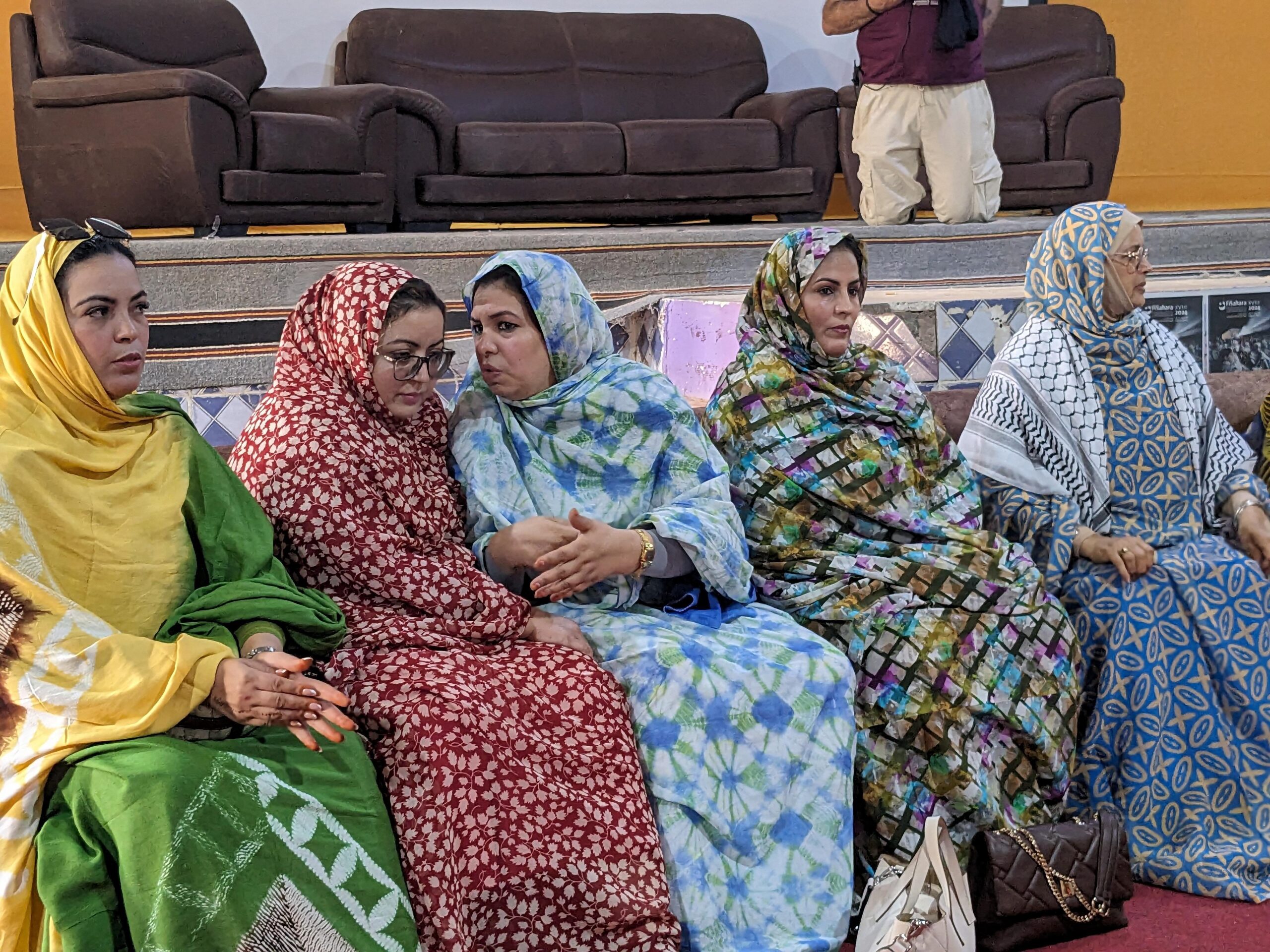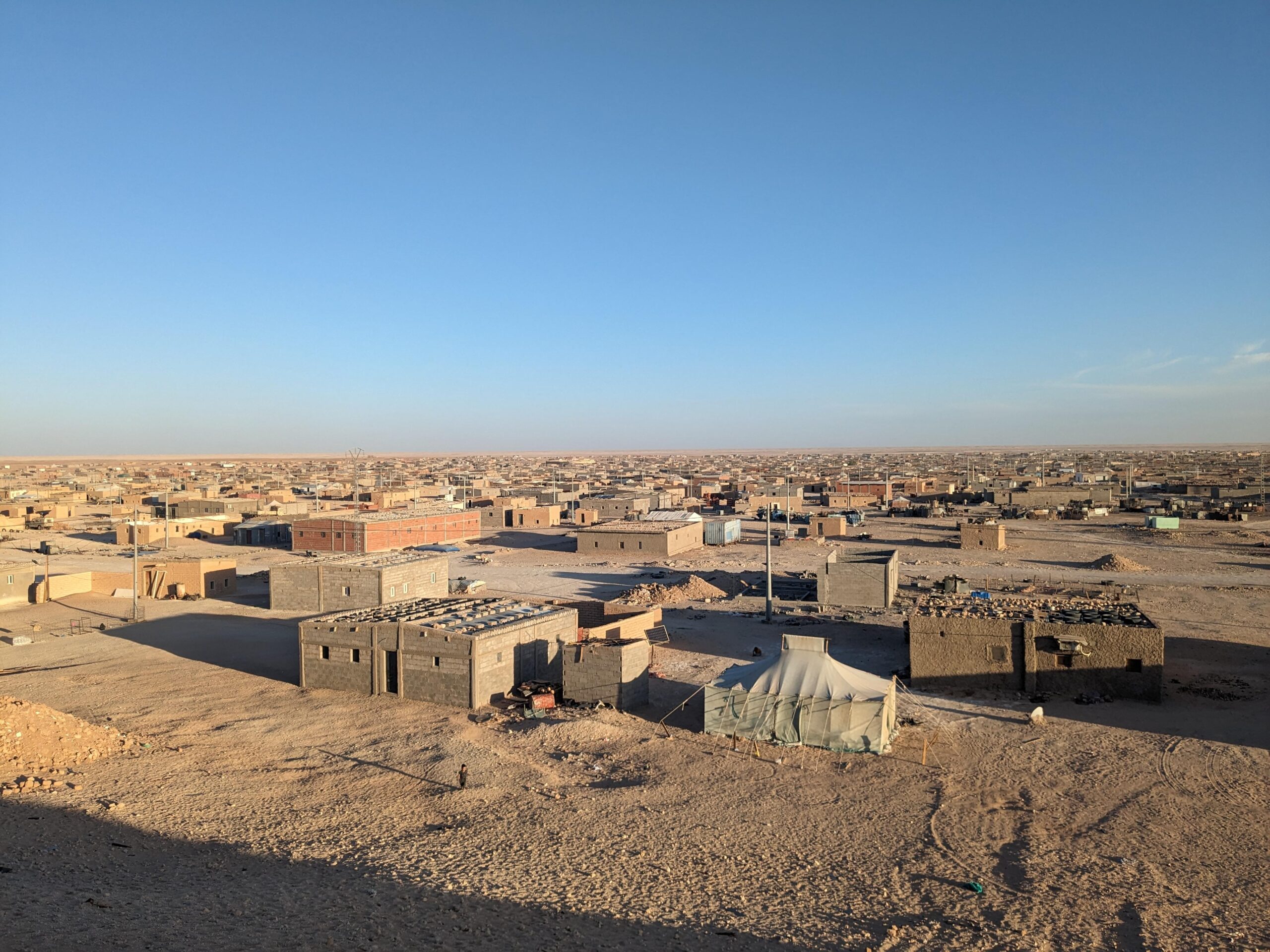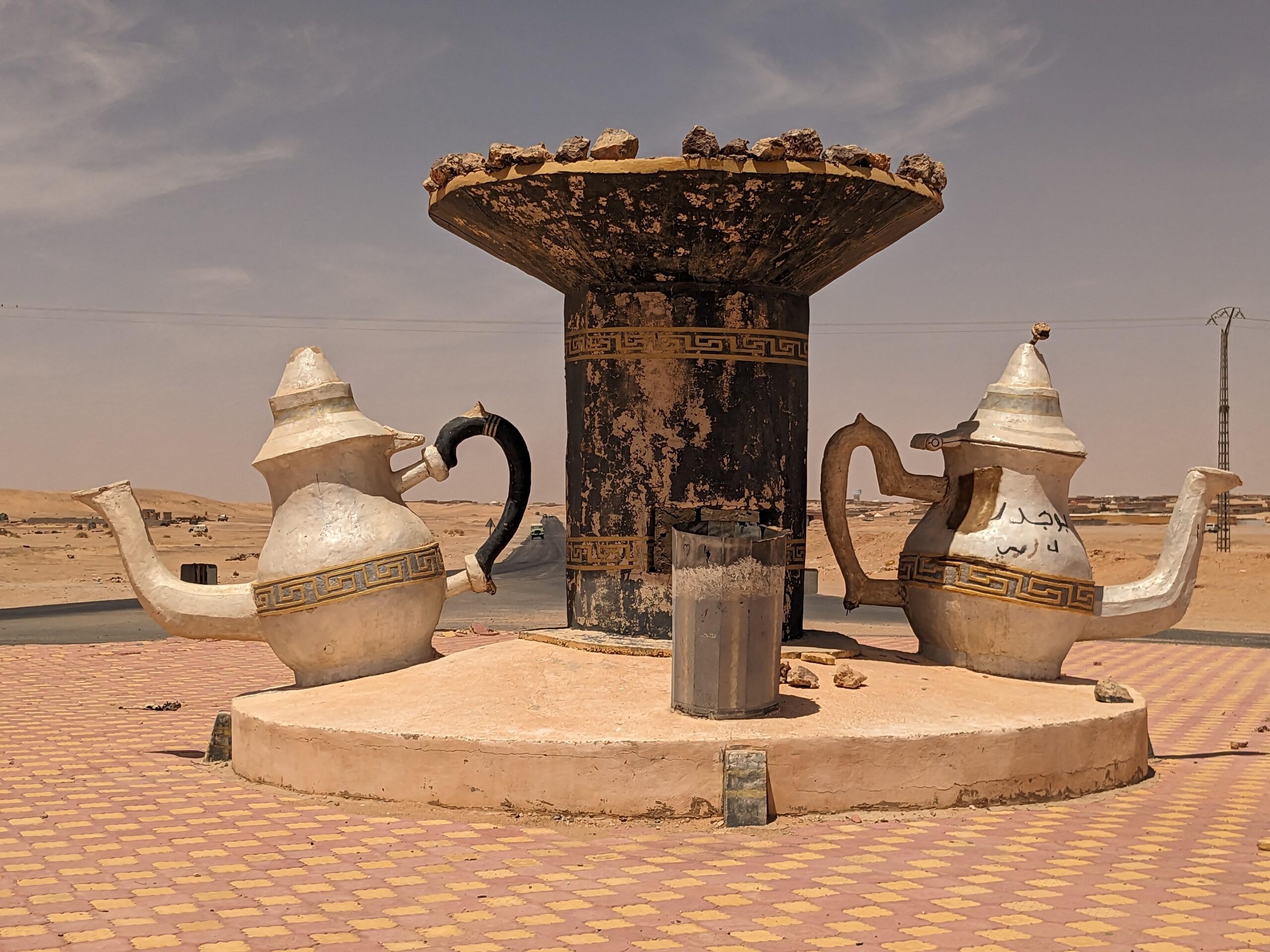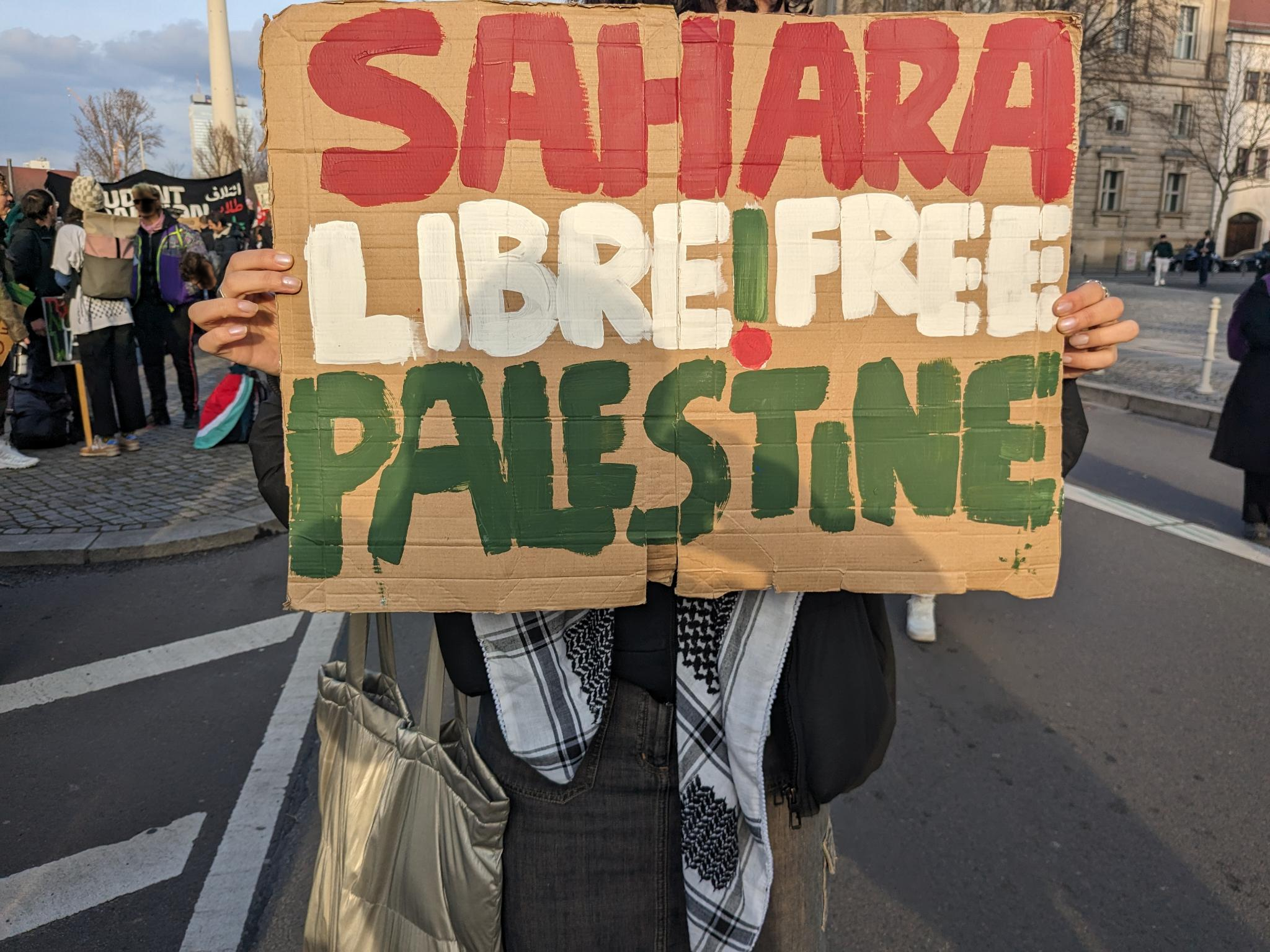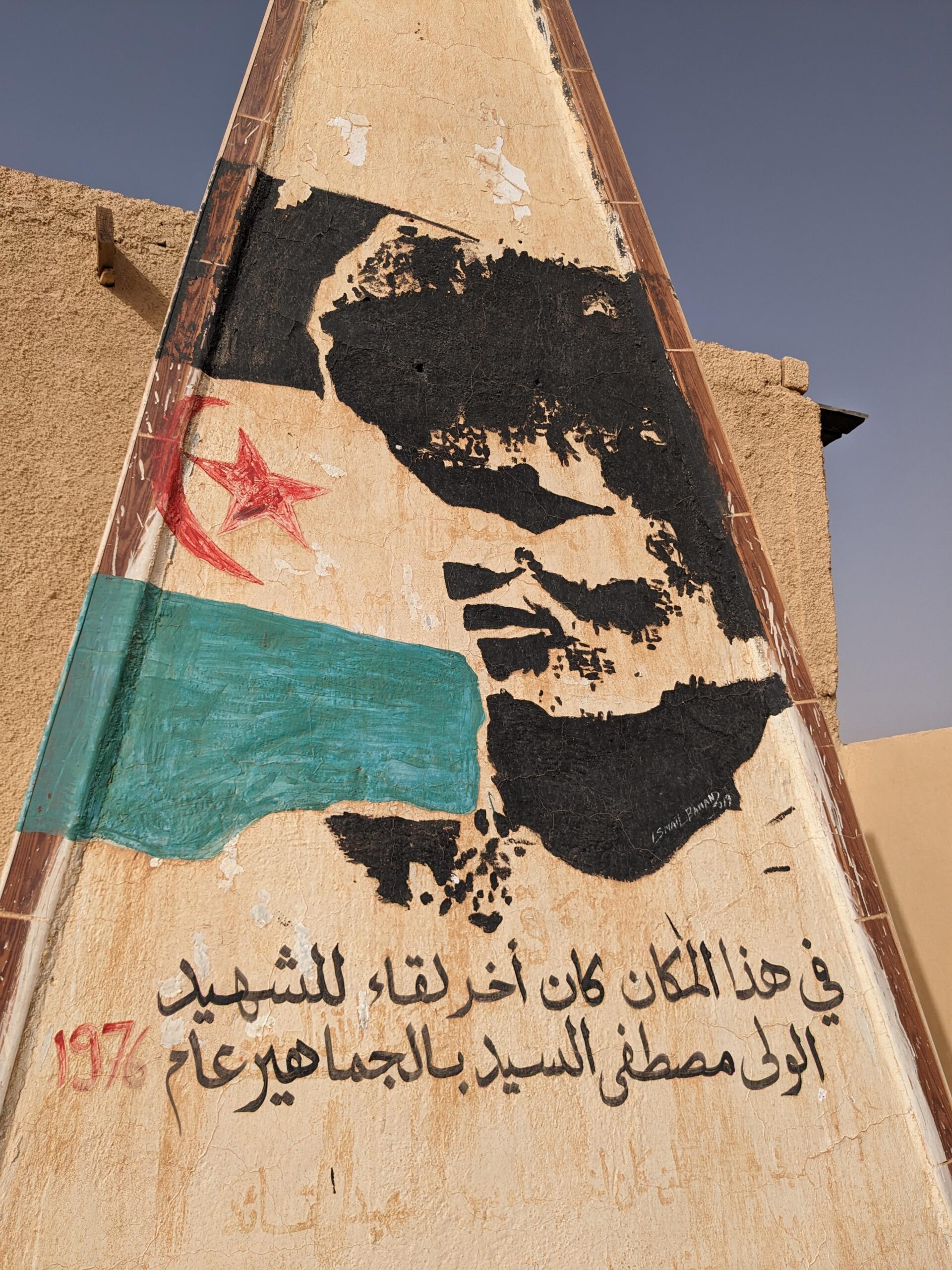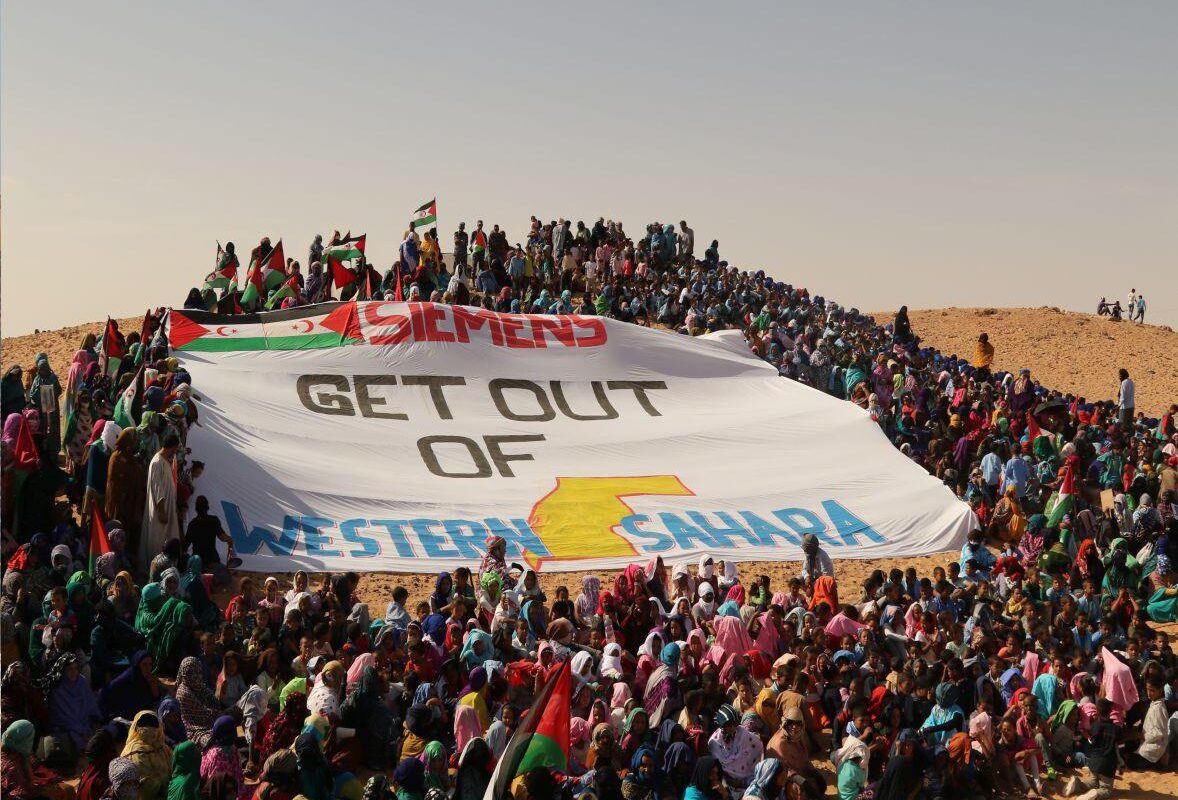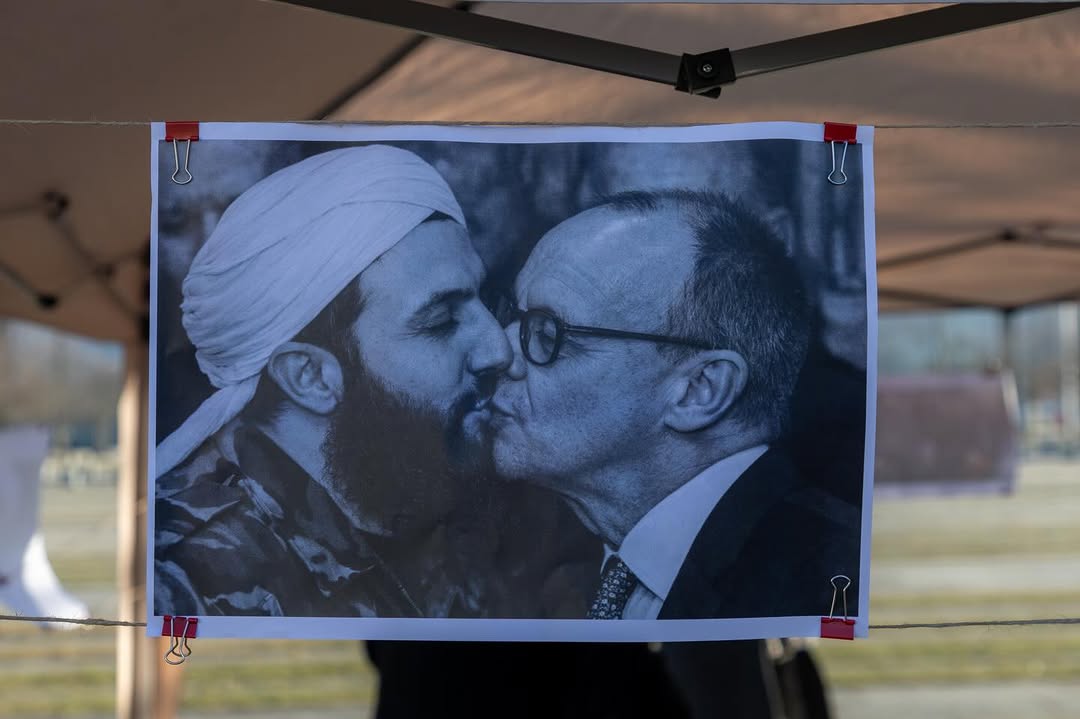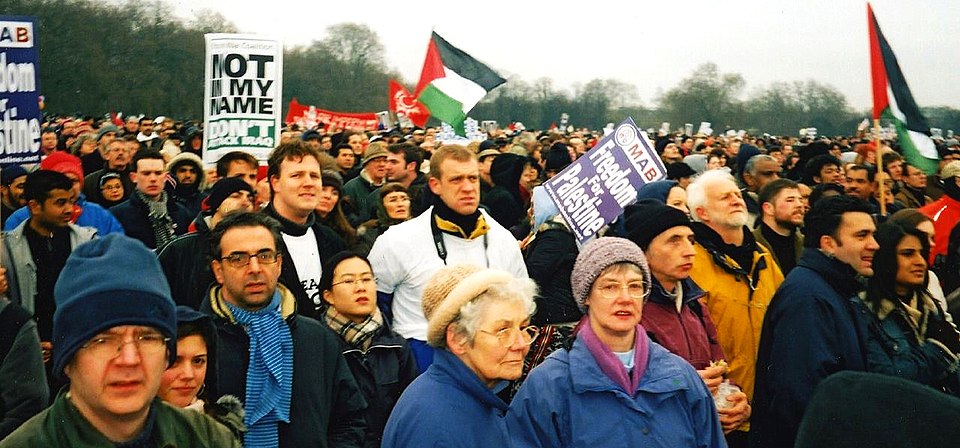In April 2024, an international delegation (anarchists, communists, radical leftists, climate and ecological movements, etc.) of around 25 people travelled to refugee camps in Algeria. The delegation members mostly live in Germany, but some come from Europe, Asia, Africa and South America (Abya Yala). The camp is administered by the Frente Polisario (Frente Popular para la Liberación de Saguía el Hamra y Río de Oro – Popular Front for the Liberation of Saguía el Hamra and Río de Oro) and is officially recognized by the UN. The purpose of the delegation was to learn about the Sahrawis’ struggle for independence against the occupation of Western Sahara by Morocco and to show their solidarity.
The Sahrawis’ struggle for liberation dates back to the 16th and 17th centuries, when they organized resistance against the first Portuguese and Dutch invaders, as well as against the French. The struggle against the French Meharist army from 1912 to 1936, the uprising against the Spanish colonial power in 1958 in Rgueya, Teguel, El Arghoub, Ausserd, Edschera and the uprising (Zemla Intifada) in El Aauín on June 17, 1970 are also worthy of mention.
The Frente Polisario, founded in 1973, fought for the independence of Western Sahara and proclaimed the DARS (Democratic Arab Republic of Sahara) on February 27, 1976 after the withdrawal of the colonial power Spain (1884-1975). As part of the Madrid Agreement of November 14, 1975, six days before Franco’s death, Western Sahara was divided up and occupied by Morocco and Mauritania in violation of international law. Decolonization had previously been decided by the UN in 1960 and 1965. The Frente Polisario put up armed resistance against the occupation.
Mauritania withdrew in 1979. However, a ceasefire was only agreed with Morocco in 1991, after 16 years of war. Since then, 80% of Western Sahara has been occupied by Morocco, while the Frente Polisario controls 20%. Morocco erected a 2720-kilometre-long wall between the occupied and liberated territory, which is guarded by over 150,000 soldiers and contaminated with up to 10 million landmines.
Following a decision on 29 April 1991, the UN mission MINURSO (Mission des Nations Unies pour l’organization d’un référendum au Sahara occidental) was set up with a mandate to hold a referendum within six months to decide on the status of Western Sahara and its independence. However, the Moroccan state refused to cooperate for over 30 years, and faced no consequences from the UN. In the course of Morocco’s occupation, many inhabitants of Western Sahara have been displaced. A large number of these refugees (around 150,000 to 200,000) are now living in five self-managed camps near the Algerian city of Tindouf. After Morocco broke the ceasefire agreements in November 2020, the Frente Polisario resumed armed resistance against the occupation.
Our delegation was hosted by families in the Smara refugee camp. Our group’s daily programme consisted of visits to various political and cultural organizations, like the youth organization UJSARIO, as well as to self-governing structures of the camps, clinics, government institutions, the University of Tifariti, the Simon Bolivar School, the journalists’ association UPES, human rights organizations, libraries, museums and the women’s organization UNMS.
The visit to the Sahrawi Red Crescent food depot documented the daily dependence on UN aid deliveries – which recently received a 20% cut to the total budget.
Due to the extreme living conditions in the desert (which can reach up to 50 degrees in the summer), growing food is extremely difficult and there is high dependence on the UN’s WFP (World Food Program), which mainly supplies rice, flour, sugar and oil, but hardly any vegetables or fruit. There have already been two major shortages, and in 2008 there were more serious hunger problems. Around 87% of the camp residents suffer from iron deficiency, and 11% have severe iron deficiency due to an unbalanced diet. In addition, 7 to 10% of children under the age of six have been diagnosed with malnutrition. The UN and the international community are partly responsible for this, as they are cutting food budgets and failing to improve the precarious supply situation.
The visits to CONASADH (La Comisión Nacional Saharaui de Derechos Humanos – The National Sahrawi Human Rights Commission) and AFAPREDESA (Asociación de Familiares de Presos y Desaparecidos Saharauis – Association of Families of Sahrawi Prisoners and Disappeared Persons) made us understand the massive human rights violations committed by the Moroccan government against Sahrawi activists.
The result is a total of around 30,000 political prisoners and detainees, arrested between 1975 to 2024. Of those, 46 are currently political prisoners, 90% of whom are in Moroccan prisons. There have also been around 4,500 disappearances (with over 500 from 1975 to 1977 alone), 445 of whom are still being sought today. This is all in addition to torture, arrests, interrogations, attacks and the prevention of demonstrations.
The uncovering of mass graves of murdered Sahrawis during the 1976-1991 war is an important part of the documentation work. In 2013, a Basque association also provided support in the exhumation and subsequent re-entombment of bones found.
Of the 15 mass graves discovered so far, some were also located in tourist centers.
Since 2020, the Moroccan army has carried out massive drone attacks on the civilian population in the liberated area, which have so far led to a number of deaths (at least 89 as of April 2024). As a result, many of the approximately 20,000 to 30,000 people living there have been displaced – most of whom have fled to the camps.
In addition, there are victims of landmines buried by the Moroccan army along the 2720 km long wall, which explode when they are stepped on. 2,600 of these victims live in the camps and some organizations support them with prostheses.
AFAPREDESA, which was founded in 1989, is banned in the Moroccan-occupied Western Sahara and operates clandestinely there. It has over 700 members and is supported in particular by women, who make up the majority of the organization and do most of the work. A clear criticism was voiced about the inactivity of the Red Cross, with which there has been hardly any contact after the discovery of new mass graves in 2013.
The Red Cross, which is also represented in the camps, does not stand up for the Sahrawi political prisoners, for whom the situation is particularly difficult. All of them are in poor health, many suffer from kidney and heart problems or rashes, and many are mistreated and tortured. They have no access to education, health care or contact with their family members. For all these reasons, there have already been several hunger strikes by prisoners, and international support has so far been minimal.
The meeting with the women’s organization UNMS (Union Nacional de Mujeres Saharauis – National Union of Sahrawi Women), which was founded in 1974 and has over 10,000 members, underlines the immense importance of independent women’s organizations. The camp structures were largely set up by women and are still managed by them in central positions today. The UNMS is active in four areas: in occupied Western Sahara, liberated Western Sahara, Algeria and the Sahrawi diaspora. It’s organized in a national congress that elects 66 women as representatives at regular intervals and is involved in various subject areas.
Women who were involved in the armed struggle before 1991 and are part of the liberation army of the Frente Polisario are today at the forefront of the resistance, especially in the occupied part of Western Sahara. They make up 42% of the delegates in the national congress, the highest proportion in the entirety of Africa.
They are also represented in the Socialist International, the African Women’s Association, the Pan-African Congress and other anti-fascist and anti-imperialist organizations. In every Wilaya (camp town) there is a women’s shelter. However, according to one of the women we interviewed, “there are still macho ideas or a way of thinking”. Compared to other countries, however, the number of cases of violence against women is lower. Internalized gender roles, such as in housework, are also a problem. After this meeting and with other organized women, it became clear to all of us that it is the women who play the central role in the social and political self-administration structure of all 5 refugee camps. Special respect was paid to the Kurdish women in the armed struggle as an expression of international solidarity.
A central point of the visit was the Resistance Museum, which took us through the history of the resistance and liberation struggle against the colonial occupations of Spain and Morocco. The captured Moroccan army war material on display was produced by Germany, and in the last ten years, Germany has supplied armaments worth over 200 million euros. These include surveillance technology (ground radar) for border security, unmanned aerial vehicles, on-board weapon control systems, parts for cannon ammunition and communications technology. Arms exports from Germany, the EU and the USA contribute significantly to the maintenance of the occupation by Morocco.
The on-site visit to SMACO (Sahrawi Mine Action Coordination Office) also showed us the involvement of international companies in the production and supply of drones. Drones used by the Moroccan army and their technology come from Israel (e.g. from the Elbit group), Turkey, the UAE, China, the USA and also Germany. The TB2-Bayraktar drone from Turkey, which is also used in Kurdistan, flies with electro-optical sensors and laser technology from a German company (Hensoldt in Taufkirchen) as well as with laser-guided missiles based on warheads supplied by TDW Wirksysteme GmbH from Schrobenhausen.
However, German companies such as Siemens, HeidelbergCement (Materials), Thyssen-Krupp and others are also involved in exploitation through the extraction and supply of raw materials, energy production and economic cooperation with the occupying regime in Morocco. Siemens supplied and installed 22 wind turbines for the 50 MW Foum el Oued wind farm, which came online in occupied Western Sahara in 2013. Thysen-Krupp is involved in phosphate mining and HeidelbergCement is involved in two cement factories via a Moroccan subsidiary (Cimenst du Maroc). More detailed information on the involvement of German and European companies in the exploitation of Western Sahara can be found on the website of the organization Western Sahara Resource Watch.
Finally, we were able to conduct a series of interesting interviews, including with Embarka Bumajruta, one of the founders of the Frente Polisario, and with Elghalia Djimi, human rights activist and former political prisoner in Western Sahara, which we will publish at a later date.
After the trip, some took part in the annual FiSahara International Film Festival in Wilaya Ausserd. The prizes at this year’s festival under the motto ‘resistir es vencer (to resist is to win)’ went to the Palestinian feature film 200 Meters, the documentary Insumisas about women’s resistance in the Western Sahara and Igualada about the Afro-Colombian activist and politician Francia Márquez.
The existence of the camps since 1975 and life under the most adverse conditions made us permanently aware of the forced expulsion of the Sahrawi population by the Moroccan state. We experienced an unbroken will to return and desire for liberation from the occupation. We heard daily that life in exile was only temporary and that the resistance would continue until the liberation of Western Sahara.
As internationalists, we must support this resistance with all the means at our disposal. We must also denounce and fight colonial imperialist structures, as well as state governments and multinational corporations both here in Germany and the EU that profit from the occupation of Morocco and thus enable and maintain it.
- We stand for the process of decolonization worldwide.
- Freedom for Western Sahara, freedom for Palestine, freedom for Kurdistan, freedom for Kanaky.
- Freedom for all those oppressed and condemned by colonization in this world.
Team of the delegation trip April 2024
August 2024
Literature tips:
- Westsahara – Afrikas letzte Kolonie Judit Tavakoli, M. Hinz, Werner Ruf, Leonie Gaiser (Hrsg.) – 2021
- Western Sahara – War, Nationalism, and Conflict Irresolution Stephen Zunes, Jacob Mundy – 2022
- Breve historia del Frente Polisario Emboirik Ahmed Omar – 2023
- Sahara Occidental – Un viaje a la libertad Taleb Alisalem – 2023
- Profit over Peace in Western Sahara Erik Hagen, Mario Pfeifer (Eds.) – 2018
Further Photos
